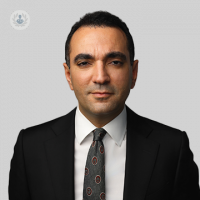Understanding fibroids and HRT in women over 50
Written in association with:In his latest online article, Mr Osama Naji gives us his insights into fibroids in post-menopausal women over 50, particularly focusing on those undergoing or considering Hormone Replacement Therapy (HRT).Fibroids are common and non-cancerous growths in the uterus, their management can be particularly challenging during the post-menopausal phase.

Natural changes in fibroids post age 50
As women reach menopause, oestrogen levels decrease, this often leads to a reduction in fibroids growth which may translate to lesser symptoms. Some women experience significant relief from fibroid-related symptoms after they turn 50, as the body’s natural hormonal changes results in less troubling symptoms, like excessive bleeding or pain.
Symptoms of fibroids in women over age 50
In women over 50, fibroids after menopause may cause symptoms like abnormal bleeding, pelvic pain, or pressure on the bowels or bladder. The spectrum of these symptoms depends on few factors: number of the fibroids, their size and, importantly, their relation to the lining of the uterus. It's important however to distinguish these from other post-menopausal conditions such as endometrial hyperplasia or even cancers. Regular check-ups and imaging studies can help in accurate diagnosis.
Effective treatment methods post age 50
Treatment for fibroids in women over 50 may include medications to manage symptoms, minimally invasive procedures like uterine artery embolisation, or, in some cases, surgery. The choice of treatment depends on the size and location of the fibroids, symptom severity, and overall health status.
Dietary and lifestyle recommendations
A balanced diet rich in fruits, vegetables, and whole grains, along with regular exercise, can be beneficial. Maintaining a healthy weight helps reduce oestrogen production, which can, in turn, help in managing fibroid symptoms. Avoiding high-fat and processed foods is also recommended.
Management approaches: Post-50 vs. younger women
For younger women, fertility preservation is often a key consideration in fibroid management, which influences treatment choices. In contrast, post-menopausal women typically have a broader range of treatment options, as fertility is not a concern.
Emotional and psychological considerations
Dealing with fibroids can be emotionally challenging, impacting body image and self-esteem. It's important to address these concerns, seeking support from counselling or support groups, and discussing openly with healthcare providers.
Fibroids and HRT
Women with fibroids who are on HRT may have unique considerations. While HRT can alleviate menopausal symptoms, it might also contribute to fibroid symptoms in some cases. Special attention is needed for atypical fibroids or those with rare sarcomatous changes, where the risks and benefits of HRT must be carefully weighed.
Can fibroids reduce effectiveness of HRT?
For women taking HRT, the presence of fibroids might complicate the management of menopausal symptoms. For instance, one of the common symptoms of fibroids is abnormal uterine bleeding, which might be exacerbated by HRT.
Effect on HRT dosage and regimen: In women with fibroids, there may be a need to adjust the HRT regimen. This might involve using a lower dose of oestrogen or adding a progestogen to counteract the effects of oestrogen on the uterus. The type of HRT (e.g., systemic vs. localised) and its delivery method might also be considered.
Monitoring and evaluation: Women with fibroids who are on HRT may require closer monitoring. This could include regular pelvic exams and ultrasounds to assess the size of the fibroids and any changes in symptoms.
Individual variability: It's important to note that the response to HRT can vary significantly among individuals. While some women with fibroids may experience mire fibroid symptoms due to HRT, others may not notice any changes.
Mr Osama Naji is an esteemed consultant gynaecologist with over 15 years of experience. You can schedule an appointment with Mr Naji on his Top Doctors profile.


